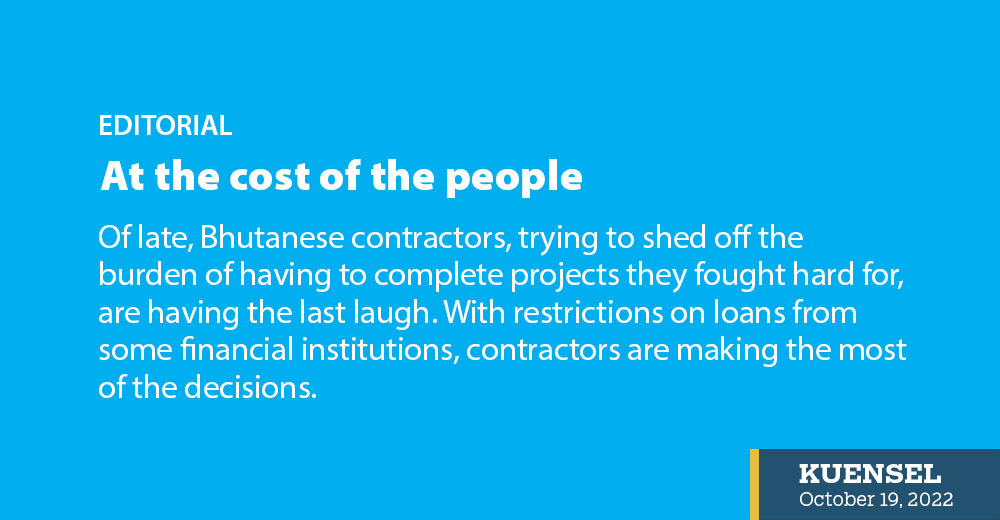Of late, Bhutanese contractors, trying to shed off the burden of having to complete projects they fought hard for, are having the last laugh. With restrictions on loans from some financial institutions, contractors are making the most of the decisions.
They would rather hand over or let procuring agencies terminate the contract. Contractors are readily and happily willing to hand over work in hand. They know that the penalty imposed on them is five times cheaper than the cost of completing the project.
Given the cost escalation and the disturbance caused by the Covid-19 pandemic restrictions, contractors knew that they would bear the brunt. The cost of goods has escalated. Carrying on or completing the work in hand would mean loss. Therefore, they would let procuring agencies terminate the contract.
While it is about profit and loss among many agencies, delaying projects is more than the cost. A contractor in Lhuentse giving up constructing three bailey bridges would have saved millions by terminating the contract. Unlike government agencies that tender out work, contractors are more mindful of profit and loss. For them, it is about profit margin. Unfortunately, for many Bhutanese, it is more than profit. It affects the livelihood of thousands of Bhutanese who have no say in policies.
A bailey bridge, in remote Bhutan, constructed on time and with quality means shortening distances and opening up to markets. However, this is the last on the contractor’s list when he applied for the work. For him, it is about how much he could make.
With the central bank restricting banks from lending, we could see many projects fail. The central bank recently intervened to prevent a financial crisis. The interventions, restricting some financial institutions from lending even with bad records cannot be debated. As the central bank, they have to come up with prudent policies. They have found out that some financial institutions have not lived up to rules and regulations. If the financial institutions are penalised for “flaunting regulations,” as mentioned by the central bank, it could have prevented problems like non-performing loans.
Policies, monetary or fiscal, should benefit the economy and the people. This has become more relevant with the economy in the doldrums. It is said that the private sector is the engine of economic growth. Those in the private sector still say, after more than three decades, that all the government provides is lip service.
The global economy is disrupted. Many are apprehensive about a global recession, as small as we are, our problems are even smaller than they could be resolved with a few meetings and the agreement of like-minded people who care for the economy and the country.
The problem, many say, is everybody is trying to protect their own turf– some not taking the risk and many not being aware of what is happening. The only immediate response is trying to save their skin with clarifications and explanations.


